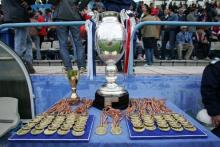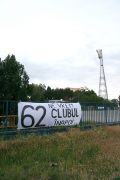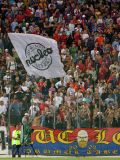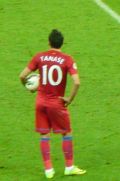|
05-11-11
From Gheorghe Hagi's genius & European Cup glory to futile feeder club - the stunning collapse of Romanian football following the great days of Steaua Bucharestdin seria "ce mai scriu altii despre noi"...Steaua were one of Europe's giants 25 years ago, reaching two European Cup finals and winning one, but their demise is systematic of Romanian football as a whole Once upon a time, army clubs dominated eastern European football. A glance through the early years of the European Cup illustrates the fact: Honved Budapest, Dukla Prague, Legia Warsaw, CDNA Sofia, Partizan Belgrade, Partizani Tirana, Vorwarts (East) Berlin and Steaua Bucharest. Steaua – meaning Star – even reached two European Cup finals, beating Barcelona on penalties in 1986 before losing 4-0 to Milan in 1989. Today, if Steaua wanted to reach the final, they would need Michel Platini to use his financial fair play regulations as an excuse to ban all the giants from western Europe. But back then Eastern European – and Romanian – football was a force with which to be reckoned. The recent history of the country’s football is a sorry tale indeed, which reached something of a nadir this past week with the latest eruption of fan violence at a Steaua game. Romania were one of the four European nations who competed in the inaugural World Cup finals in Uruguay in 1930. Such was the enthusiasm for football at a high level that King Carol made up the wages lost by the players while away on the high seas. The post-war advent of communism brought mixed blessings. One was the autocratic commandeering of sport to serve the promotional demands of the state. Hence the same model of army and police clubs throughout the countries behind the ‘Iron Curtain.’ Army clubs held a decisive advantage. Players were not paid for playing football but for their nominal jobs. Hence the term ‘state amateurs.’ The number of times any army club player ever saw a parade ground could be counted on the fingers of one hand, of course. Conscription was a fact of life everywhere, with at least two years of military service compulsory. The poverty-ridden state of post-war central Europe made the security of military sport an attraction in itself. Thus a conscript with footballing talent would happily obey an army order to abandon his home-town club and play for Honved, Steaua, Legia, or whoever. Sport provided eastern Europe’s smaller nations with a rare passport to the wider world. Romania was a perfect example. Power was shared largely by Dinamo, the secret police team, and by Steaua (previously CCA: Central House of the Army). Few domestic rivals ever matched them or wanted to. For instance, after the teenage Gheorghe Hagi suddenly lit up the Romanian league with his talent for Sportul Studentesc in the mid-1980s both he and his club were surprised to find himself transferred to Steaua. When Sportul officials claimed a transfer fee they were politely but firmly told to forget it. These were the climactic years of Romanian football as a favourite toy of the notorious Ceausescu regime. Dictator Nicolae’s favourite club were Steaua. In the mid-1970s they opened their own multi-sport stadium complex. Subsequently they dominated the national sports scene in handball, ice hockey, basketball, volleball ... and football. In 1986 Steaua became the first Romanian team, and only the second from eastern Europe ever, to reach a European Champions club final. In 1966 Partizan Belgrade from Yugoslavia had lost to Real Madrid. Steaua went one better. Against all expectations they beat mighty Barcelona in Spain – in Seville – after a penalty shootout. Just about every season Steaua won the league and cup double and they returned to the European Cup final in 1989 on the back of a world record, three year, unbeaten run in the Romanian league. But change was afoot. The political balance of power was beginning to shift while the players could now look for lucrative transfers abroad. Steaua, their minds elsewhere, crashed 4-0 to Milan in Barcelona and it could have been worse. Later that year came the Romanian Revolution, the Christmas Day executions of Ceasescu and his wife Elena, and the difficult transformation towards a new world. Heroes of Steaua and the rest who transferred abroad brought their new knowledge of tactics and fitness back to a national team who went on to peak at the 1994 World Cup where they reached the quarter-finals. The price of political freedom was the implosion of domestic football. State support vanished overnight and too many clubs were taken over by directors whose interests lay in anything but sport. Any teenager with a glimmer of talent was sold off to the west as soon as possible. The quality of the domestic game collapsed. Political and gang rivalries were soon being acted out on the terraces. Last weekend a hooligan attacked Steaua’s Gheorghe Galamaz on the pitch. Such was the confusion that two other Steaua players were suspended initially for coming to the aid of their battered team-mate. Long forgotten now are the club’s greatest days ... fading away, back behind the Iron Curtain. Case in point: never yet have Steaua reached the knockout stages of the Champions League. by Keir Radnedge Keir Radnedge has covered every World Cup since 1966, analysing the international game for newspapers, magazines, TV and radio around the world FCSTEAUA.RO este un site deschis, facut de suporteri, pentru suporteri. Asteptam articolele scrise de voi, daca aveti ceva de spus si credeti ca o puteti face intr-un articol, nu ezitati!
|
Pentru alte melodii, cantece ale galeriei, imnuri etc, vitiati pagina cu player-ul mp3
FULL VIDEO - A 21-A CUPA! STEAUA a cucerit cea de-a 21-a Cupa a Romaniei
(a 22-a, daca e sa socotim manevrele lui Il Muce din '88!) si a saptea in fata celui mai mare simbol al frustrarii din fotbalul romanesc, Dinamo.
Di STEAUA a cucerit cea de-a 21-a Cupa a Romaniei
(a 22-a, daca e sa socotim manevrele lui Il Muce din '88!) si a saptea in fata celui mai mare simbol al frustrarii din fotbalul romanesc, Dinamo.
DiDistrugerea jucatorilor - specialitatea casei-21951368.jpg) Dacă săptămânile trecute ne-am ocupat de umilirea antrenorilor vezi articol
si de frauda financiară făcută în club vezi articol, această mică trilogie ajunge la final, când vom face � Dacă săptămânile trecute ne-am ocupat de umilirea antrenorilor vezi articol
si de frauda financiară făcută în club vezi articol, această mică trilogie ajunge la final, când vom face � |



 TV LIVE
TV LIVE
































































chester123 sâmbătă la 17:28
yozisss sâmbătă la 17:31
Gandalf the White sâmbătă la 17:37
Keir asta a vrut doar sa prezinte stirea cu tiganul care i-a dat perversa lu` Galamaza si a mai facut pe interesantul, fara a avea habar de ce vorbeste - aceleasi balmajeli vestice, preconceptii, prejudecati si etichete.
Chipurile o sinteza a istoriei clubului Steaua, circumstantiata realitatilor si transformarilor, atat ale sportului cat si ale civilizatiei est-europene.
Multe formule-tip, pe care le folosesc genul asta de materiale, pentru a acoperi o plaja prea larga de sensuri. Parageneralitati si lozinci.
P.S. Si o greseala in statistica din articolul original, in 1987, nu in 1986 s-a castigat Supercupa Europei. Si ce legatura are Hagi cu continutul articolului, de-i pui 2 poze de la nationala anilor 2000, ca sa-l ilustrezi?
SuperstaR18 sâmbătă la 20:15
naiyba sâmbătă la 22:38
greenyes sâmbătă la 22:54
Gandalf the White ieri la 08:03
Total de acord cu tine, l-am notat cu 5 stelute pe cel care a avut initiativa. Sunt foarte utile aceste materiale, e foarte bine ca se semnaleaza. Eu am comentat continutul, nu faptul ca a fost postat.
pcsbb ieri la 09:08
Fraza asta e dureroasa.
Alex ieri la 09:30
Ca ei oricum traduc mai tot ce apare pe goal.com.
E interesant pentru mine ca acest articol aparea pe goal.com la Top Specials scris de un englez, de-aia l-am si pus pe site. Ca sunt mici inadvertente, ca nu e chiar spot-on in anumite chestii sunt de acord, dar mesajul principal ramane.
Si intreb din nou. BAH UNDE SUNT AIA PASIONATI DE FOTBAL CARE NU MAI SUPORTA ARTICOLE CU Gigi SI VOR SA COMENTEZE DE SPORT?
Acest articol are 7 comentarii in 2 zile de la postare. Sau poate nu o sti lumea engleza...
AndyQ ieri la 10:12
Acum o sa ne spuna ca toata planeta e nebuna, doar ei nu. De ce il mananca pe englezul asta sa strice atmosfera de la Steaua?! El n-are nicio treaba cu fotbalul e doar jurnalist, nu cunoaste el spirit ros-albastru, etc.
Toti sunt nebuni, toti sunt contestatari, toti sunt drogati, doar ei, elvetienii, conteaza.
stii ce e culmea!? Faptul ca astia dispretuiesc orice suporter care spune: Asta nu-i Steaua pe care o stiam, dar in loc sa-si faca un site al lor, al lingailor si al iubitorilor de cacareze de oaie, tot aici intra, dar nu cu scopul de a readuce spiritul pentru cei "pierduti" ci pentru a-si cauta un motiv de cearta, pe cineva care sa-i contrazica. Pai si cine-i ipocrit in cazul asta?!
Nu va tine nimeni aici, fratilor! Internetul e FREE, puteti oricand sa va adunati intr-o comunitate a voastra, unde sa va dati zilnic dreptate, sa va felicitati pentru victorii, transferuri, trofee. De ce nu o faceti?! Site-ul asta e administrat de oameni care contesta situatia de la Steaua, mizeria, inselatoria, furtul, etc. Ce aveti voi in comun cu ei?!
red&blue_boy ieri la 14:35
Fraza asta e dureroasa.
Exact...Si va mai trece mult, mult timp pana vom mai avea parte de great days. Daca vom mai avea vreodata...
superdorex ieri la 16:40
Andreea 07.11.2011@09:44